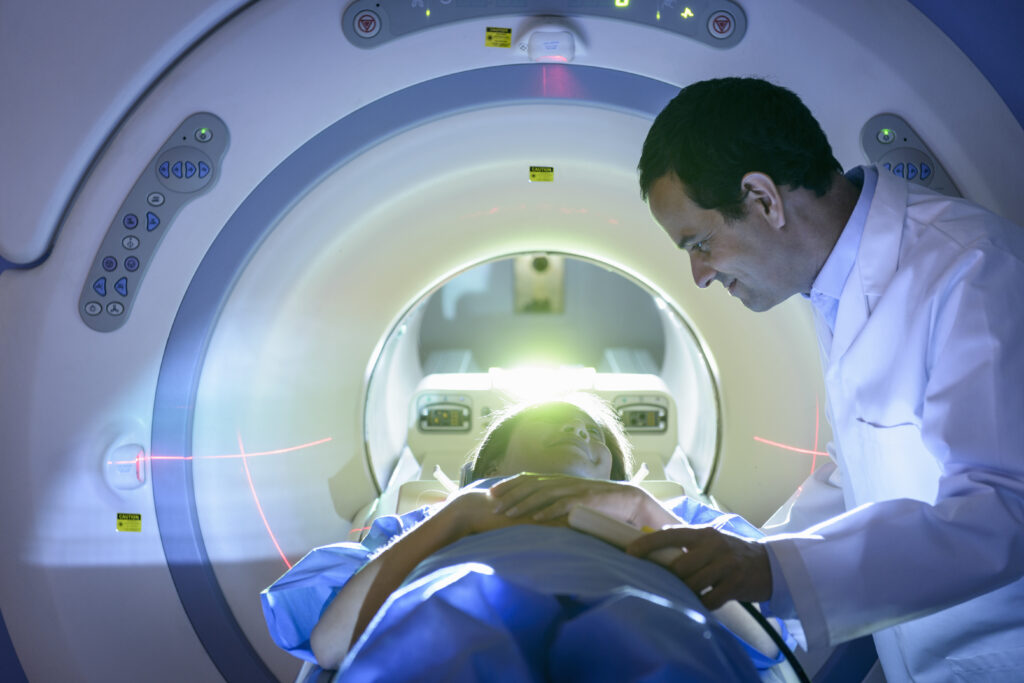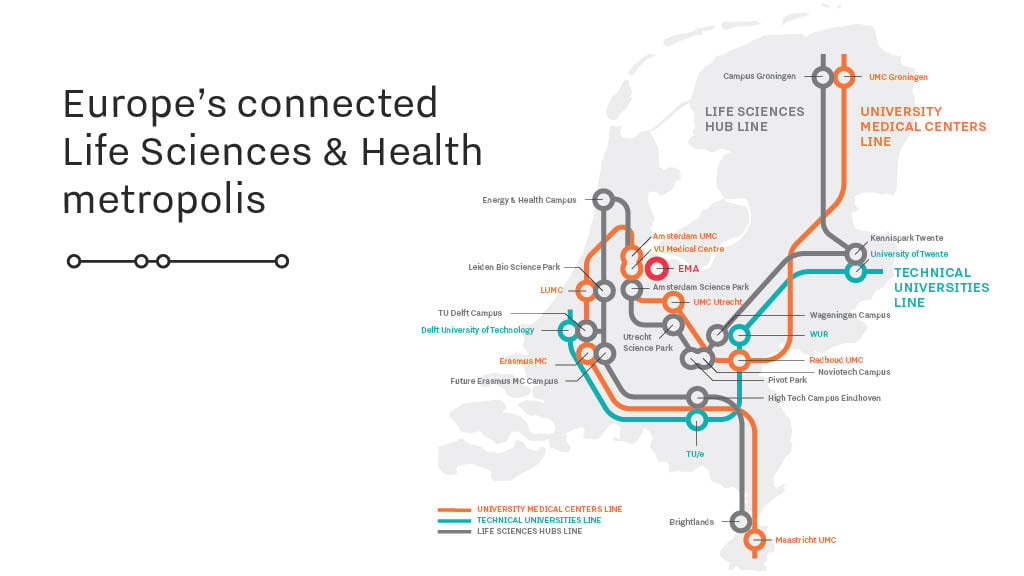The Netherlands: Making an Impact in Oncology
From prevention to diagnosis to patient care, the Netherlands supports a full lifecycle of cancer treatment
The Dutch expertise in oncology is anything but new. In fact, the Netherlands was one of the first countries to have a specific cancer center: the Netherlands Cancer Institute (NKI). Founded in 1913, the NKI is now among the world’s best comprehensive cancer centers. Case in point, the Netherlands has a long history of oncology innovation, from NKI and Antoni van Leeuwenhoek Hospital to Organon’s 100-year legacy to stem cell pioneer Hans Clevers and Nobel Prize winner Ben Feringa.
Through innovative prevention, diagnosis and treatments, fostered in a connected and collaborative environment, the Netherlands is leading in oncology not just in Europe, but around the world.
And that’s not a biased statement. A recent study named the Netherlands as the second-best nation globally for cancer treatment, and the top in Europe. With more than 500 public-private partnerships in the country, a central location for R&D collaboration and accessibility for Europeans seeking treatment – as well as strong logistics to ease manufacturing and distribution internationally – the Netherlands ticks all the boxes. It’s no wonder that companies like Kite Pharma, SHINE Technologies and Bristol Myers Squibb (BMS) decided to expand to the Netherlands for their European business operations.
The leading edge of innovation
According to the World Health Organization (WHO), cancer is the leading cause of death worldwide. Prevention, early detection and effective treatment can help manage the otherwise devastating disease – and in support of these efforts stands the multifaceted Dutch oncology ecosystem. At a national level, the Netherlands conducts highly successful screening programs to detect various forms of cancer in the Dutch population.
When it comes to diagnosis and treatment, the Netherlands is on the forefront of innovation. Hands-on and open to innovation, researchers and doctors work together with companies in the Netherlands to focus on precision medicine, leveraging health data to curate treatment regimens for individual patients. For example, Hubrecht Organoid Technology (HUB) and Stem Cell Technologies are advancing personalized treatments and gene therapy through next-generation organoid technologies. In fact, organoid research partially originates in the Netherlands, thanks to Hans Clevers’ collaboration on the technology with Japanese researchers. Meanwhile, pan-European projects like EuCanImage and CHAIMELEON are tapping into Dutch AI expertise and knowledge institutions to build sophisticated imaging data platforms.
US-based Kite Pharma and Leiden UMC have entered into a research agreement to identify and develop T-cell receptor product candidates targeting tumors that are associated with HPV infection. Meanwhile, UMC Utrecht, Elekta and Philips are improving cancer treatment by determining exactly where tumors are located in patients during radiation therapy. The three have collaborated on MR-LINAC, a state-of-the-art cancer treatment that combines a radiotherapy accelerator with a diagnostic MRI, leading to more precise treatment. Finally, Crown Biosciences provides preclinical oncology drug development and validation services using HUB’s organoid technology.
The Netherlands is also pushing the envelope for nuclear medicine and proton therapies. The Netherlands has established itself as the largest medical isotope producer in the world, making it an ideal testing ground for nuclear innovation. The Dutch Isotopes Valley – a collaboration between URENCO, TU Delft and NRG – provides cutting-edge research in nuclear medicine. Other Dutch centers like Holland PTC, UMC Groningen and Maastricht UMC are fostering collaboration and research in the field of proton therapy to reduce the risk of side effects for cancer patients. These centers will continue to collaborate with newcomers like SHINE Technologies in the Netherlands.
Research institutes and centers of expertise
Partnerships are a keystone of Dutch oncology and success. Connections between the private sector, government, academia and patients are a major component of the “quadruple helix” approach that the Dutch take not only in oncology, but in life sciences & health and industry more broadly.
Jan van de Winkel, CEO of Genmab, praises the Netherlands’ collaborative culture: “There is a great willingness to work together with academic teams and with other companies, and I think that’s quite unique to this innovation ecosystem, that’s why the Netherlands is a very good place to be. This eagerness to communicate and connect is one of the central reasons that we are so successful up until now.”
Across the Netherlands, centers of expertise are paving the way for a cure. One of the largest strategic public-private partnerships, Oncode Institute, unites 800+ excellent cancer researchers across 12 universities, academic hospitals and research institutes in the Netherlands. The aforementioned NKI is among the world’s best comprehensive cancer centers. At the same time, the Netherlands devotes significant resources to pediatric oncology with the Princess Maxima Center, the largest hospital of its kind in Europe. Meanwhile, Radboud UMC specializes in urologic oncology and provides leading prostate cancer care and research with innovative technologies and treatments from companies like MDxHealth, Sorteria, and ORCA Therapeutics. Not to mention that Radboud University has been ranked as the fourth best radiology school in the world.
NecstGen (the Netherlands Center for the Clinical Advancement of Stem Cell and Gene Therapies) in Leiden is one of the newest expert centers in the Netherlands, supporting academia and industry to translate research and clinical trials into solutions for patients. This state-of-the-art facility and knowledge partnership is working to address the barriers to entry for next-generation therapeutics, including immuno-oncology. In Amsterdam, the Hartwig Medical Foundation advances personalized treatments for cancer patients by offering an extensive test that maps out the DNA of tumors. The Foundation then gathers all of its genetic data and clinical information into an anonymous, secure database, which is made available for research.
Having access to these campuses is already a win for companies looking to expand into the Netherlands. Having them be easily accessible, just a short drive or train ride away from each other, underscores the benefits of doing business in a smaller, well-connected nation like the Netherlands.
Invest now, cure tomorrow
Foreign companies looking to invest alongside cutting-edge innovation can easily seek out the variety in oncology expertise across the country. Pivot Park is one such example, hosting more than 60 biopharmaceutical companies that contribute to the Netherlands’ research-to-treatment pipeline.
Several innovative oncology therapeutics tied to North America have roots in the Netherlands. Merck/MSD’s immunotherapy KEYTRUDA® was devised in the Dutch city of Oss, as was Calquence® from Acerta Pharma. Meanwhile, US-based RadNet recently acquired the AI-based oncology solutions of Netherlands-based Quantib and Aidence. These all show that the American way of working combined with the collaborative nature of the Dutch, is a synergy for success.
Investing in the Netherlands and its oncology sector means being in good company. Leading businesses from around the world have already made the move to the Netherlands. From research and imaging to diagnosis and treatment, companies are taking advantage of the progress and knowledge that Dutch scientists are eager to share.
Recent success stories act as testaments to the potential that companies are unlocking in the Netherlands. Kite Pharma, Bristol Myers Squibb, Genmab, Merck/MSD, Immunicum and others are combining foreign investment and Dutch innovation to obtain better cancer outcomes.
Get in touch with the Netherlands Foreign Investment Agency to learn more about how Dutch innovation, talent and infrastructure can help elevate your company’s efforts in oncology.
5 April 2022


